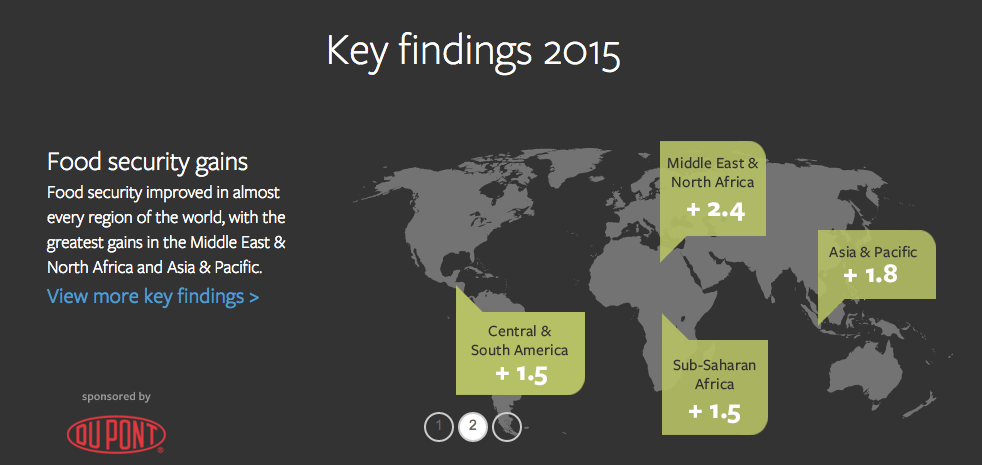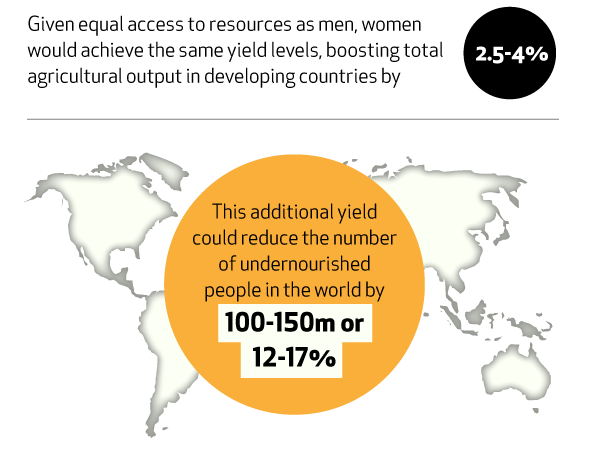On World Food Day this year, we have reason to be hopeful. According to the 2015 Global Food Security Index, compiled by the Economist Intelligence Unit and sponsored by DuPont, food security has improved in almost every region of the world.
Sustained economic expansion in most regions and rapid growth in the developing world have been key drivers of this growth, and government investments in agriculture and infrastructure—begun in the wake of the food price shocks of 2007-08—are paying off.

Although there are many regions in the world where food insecurity persists, I am optimistic about what we can accomplish together – with farmers, women and youth in particular. They are the change agents who possess the potential to end hunger.
Taking Innovation to the Farmer
As Norman Borlaug, the namesake of the Borlaug Dialogue International Symposium at which global leaders are gathered this week commented, innovations that will boost productivity are sorely needed, and it is our responsibility to “take it to the farmer.” At DuPont, we couldn’t agree more.
In Ethiopia, we are participating in a collaboration led by the Government of Ethiopia and along with the U.S. Agency for International Development – USAID – to boost yields through improved maize seed, agronomic training, and connections to credit and markets. Maize is grown by about 8 million farmers in Ethiopia, but is extremely susceptible to drought and disease. Within the first year of the project, participating farmers experienced doubling or even a tripling of their average yields and saw their incomes increase by as much as US $500.
Acknowledging the critical role of women
Women play an indispensable role in agriculture and empowering women to have a greater voice in decisions that affect their lives, and by extension their families and communities, will have catalytic impacts on food security and poverty alleviation worldwide.
If women were given equal opportunities as men, it is estimated that yields on their farms would increase 2.5 percent- 4 percent. This is enough additional production to reduce the number of undernourished people in the world by 100-150 million. In sub-Saharan Africa alone, that would reduce the number of malnourished children by 1.7 million.
In Africa, the majority of those who produce, process, and market Africa’s food are women, but only one-in-four agricultural researchers is female. That is why, in 2012, we began a collaboration with AWARD – African Women in Agricultural Research and Development – to host two of their fellows for two-year research instalments in our global laboratories. Current AWARD Fellow, Phyllis Muturi, spoke at the Global Harvest Initiative panel this week about how she plans to share key lessons in agriculture research, and biotechnology in Kenya to help advance food and nutrition security.
Engaging the next generation of innovators
In addition to farmers and women, we have to ensure that youth are a part of the conversation. Young people are going to be crucial in our fight against hunger. We need to take the employment opportunities to them, to show them how powerful a career in agriculture can be.
That is why, when DuPont rolled out a series of food security goals in 2012, we focused one of them on transferring the knowledge of sustainable food and agriculture to the next generation. This work includes Projeto DuPont Escola (DuPont in the School), for example, an interactive program designed for children in Brazil that promotes the importance of citizenship and sustainable agriculture. Due to this program, and many others like it around the globe, DuPont announced this week that we already have met our 2020 goal for 2 million youth engagements.
But we are not stopping there. Feeding more than 9 billion people by 2050 is no doubt one of the greatest challenges humanity has ever faced. By empowering farmers, women, and young people to step up to this challenge though, we can ensure it becomes a reality.
Jim Borel gave a keynote speech “Innovation: an essential ingredient to feeding 9 billion” at the Borlaug Dialogue in Iowa this week. Tune it to the last day of the conference on the live stream or follow #FoodPrize15 for updates.




